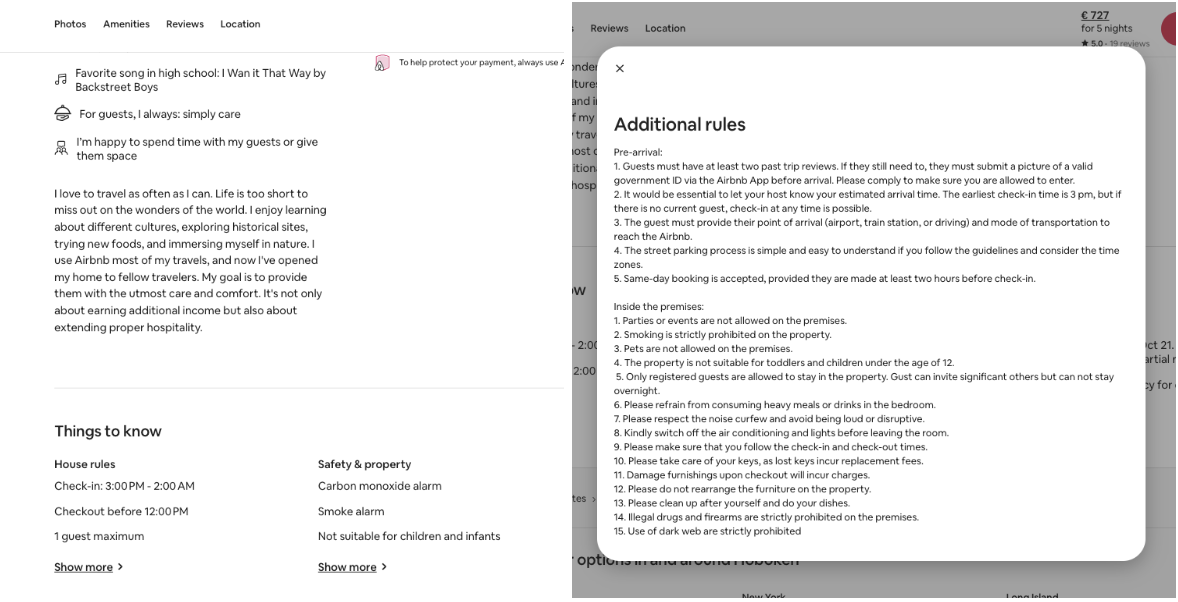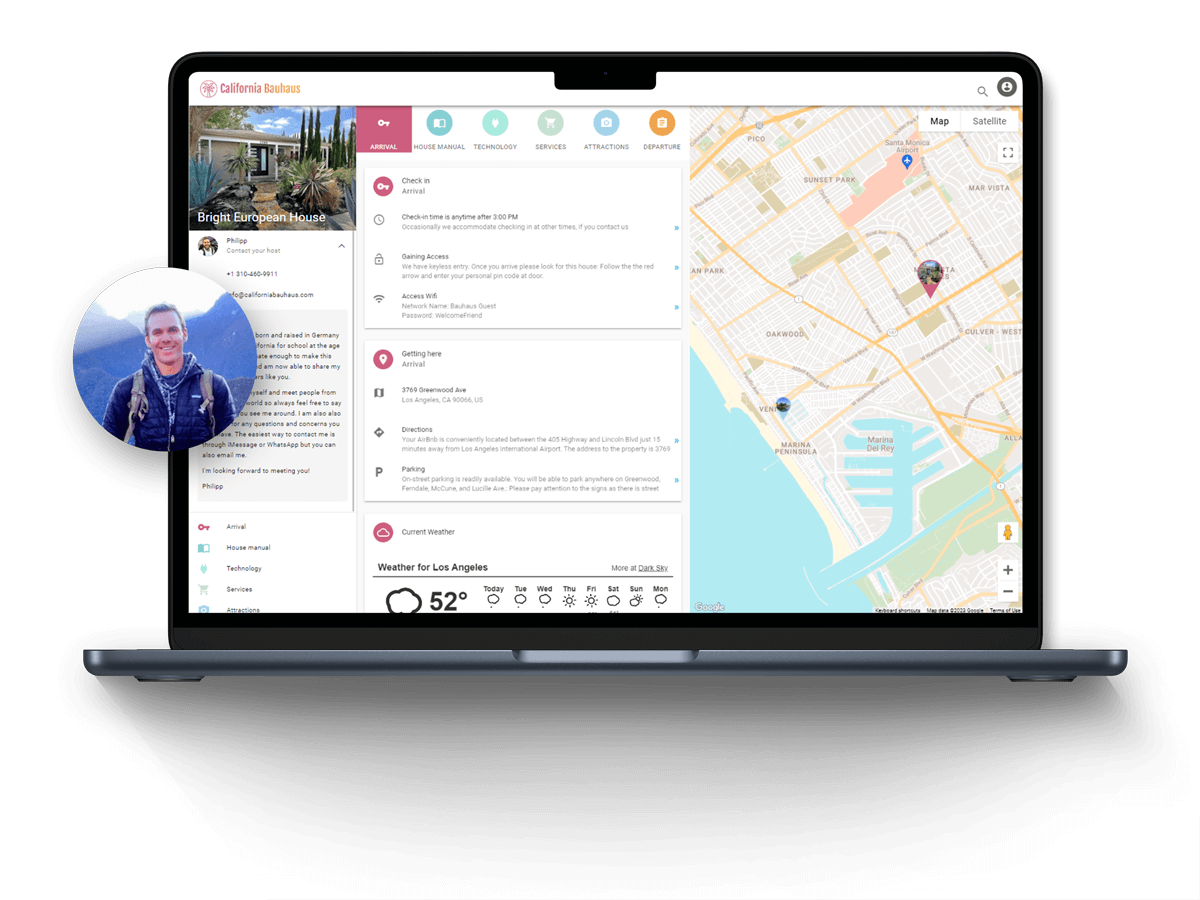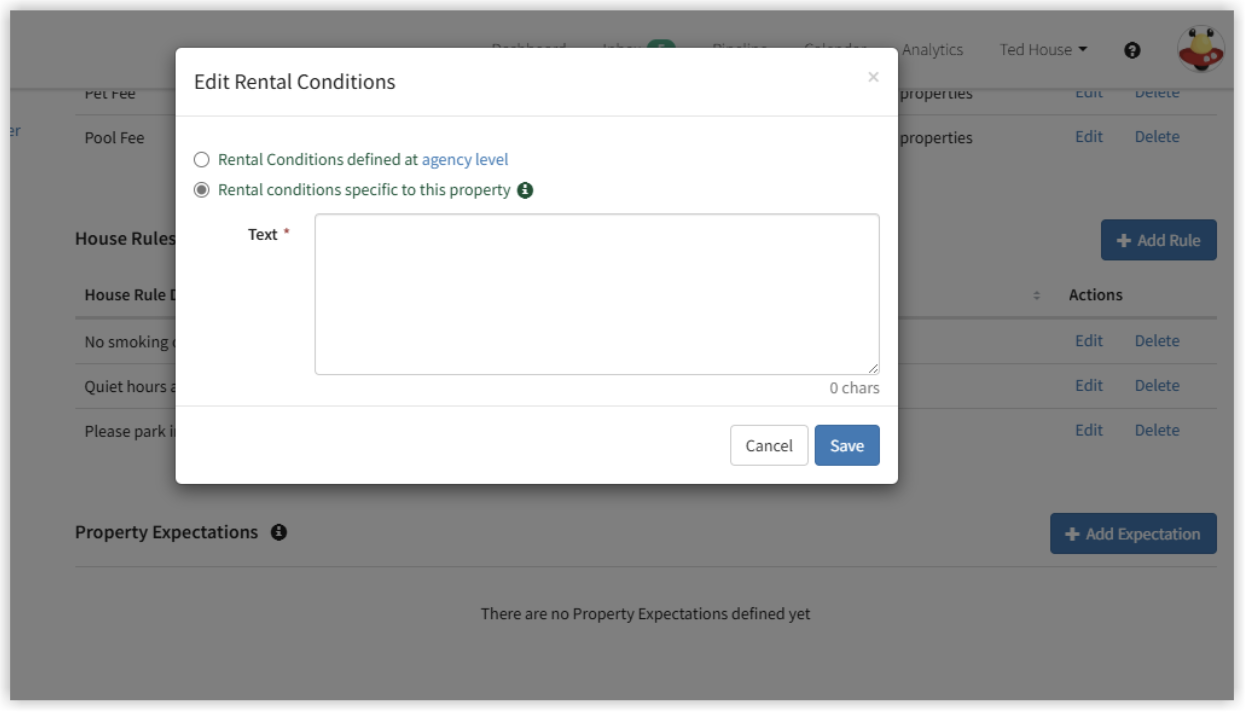When hosting on Airbnb, setting clear expectations and boundaries ensures a smooth guest’s stay. A rental agreement is the most efficient way to achieve this.
But not just any rules will do. Before putting anything into writing, you must consider what Airbnb allows, any local requirements, and what works best for your specific setup. This helps you create policies that keep your property safe and seem fair and realistic to guests.
So what does a solid Airbnb rental agreement look like? Let us show you what policies to include, how to tailor them to your context, and the best ways to communicate them to prospective guests.
What is an Airbnb rental agreement?
An Airbnb rental agreement is a separate legal document between you and your guests that outlines the specific terms of the stay. It can supplement the platform’s existing terms of service but not override them.
Agreements can cover details that Airbnb doesn’t specifically outline in its standard terms that are essential to protecting your short-term rental business. For example, Airbnb’s terms ban disruptive gatherings regardless of size to avoid bothering the local community. But if you live in a rural area, you may need to add rules about leaving the wildlife and farm animals alone.
Does Airbnb allow rental agreements?
Airbnb states that guest contracts are permitted, provided you disclose them before the booking stage. You must include a clear summary in your listing description with a link to the full terms of the agreement. This gives prospective guests a chance to check whether your terms align with their needs.

If you don’t share your rental agreement before confirmation, Airbnb allows guests to cancel the booking and receive a full refund. That means you must collect their signature in advance to prove you met the platform’s conditions.
No terms in your rental agreement can override Airbnb’s core policies, including:
- Refunds and cancellations
- Anti-discrimination
- Privacy expectations
- Safety standards (such as working smoke alarms)
- Payment processing terms
Terms must also abide by local regulations. For instance, Airbnb’s privacy standards don’t allow hosts to interfere with a guest’s ability to use private spaces. That means your agreement can’t require anyone to consent to monitoring inside the property, whether that’s with cameras or recording devices.
Why do you need an Airbnb rental agreement?
Some hosts worry that rental agreements might deter bookings or frustrate potential guests. While that’s a valid concern, they can actually protect both sides.
Below are some of the main benefits of having a rental agreement:
- Clearer expectations: Guests understand how to use the property and what rules apply, which reduces confusion.
- Defined terms: You have an opportunity to explain exactly what you mean by certain rules. For example, ‘check out at 11 am’ might involve handing over the keys or simply leaving the property.
- Legal coverage: Should anyone fail to follow your rules and cause damage to your properties, you have signed proof that they agreed to your terms.
- More professionalism: A formal agreement shows guests you run your rental like a business, which builds trust and credibility.
- Higher guest satisfaction: Clear communication from the outset means guests are more likely to enjoy their stay.
- Support for ongoing relationships: Detailed agreements create a strong foundation for relationships with recurring or long-term Airbnb guests, as everyone knows where they stand from the start.
What do you need to include in an Airbnb rental agreement?
What you should include in your Airbnb rental agreement depends on your specific property, location, and preferences, but there are some key elements that work across contexts.
Names of parties involved
Clearly identify all the individuals entering the agreement. That includes your name or your organization and all guests staying at the property.
Airbnb only gives the details of the main guest and the total number of people. However, you can ask for the full names of anyone staying for screening and ID verification, as well as the rental agreement.
Property details
Provide the property address to create a complete record. You may find it helpful to include further details about the rental, such as rooms or amenities, that are relevant to your policies.
In particular, give information about convenience and accessibility. Guests staying at your mountain cabin should know that they’re a fifteen-minute drive from the nearest shop, or there’s a steep hill leading up to the property. You also need proof that they understand what they were agreeing to.
Occupancy limits
State the maximum number of guests allowed overnight. You can also clarify how many additional people can be invited onto the rental property during the day.
Explain why you need to keep the number of guests below a certain limit. Everyone will be more likely to comply and feel amicable toward you when they understand the reason behind the rule.
Note that Airbnb doesn’t set occupancy limits, but strictly prohibits parties. Plus, many local authorities have rules like ‘no more than two people per bedroom’ to avoid disruptive gatherings and overcrowding. Although you can set a stricter limit for your property, you can’t go the opposite direction and allow excessive noise and guests.
Check-in and check-out times
Specify the rental period alongside the check-in and check-out times. You can mention any guest responsibilities when entering or exiting your properties. For example, you might ask them to ensure the bins are empty before they leave.
Just keep instructions high-level to avoid overwhelming guests and send a more in-depth version in a message or within your digital guidebook. You can use a platform like Hostfully to design custom guidebooks and add text, images, and video to explain check-in and check-out processes.

Cancellation policy
Reiterate your chosen Airbnb cancellation policy, whether it’s flexible or strict. You can remind them how far in advance they need to terminate their booking to receive a full or partial refund. Just keep whatever you write consistent with what’s listed on your profile to avoid conflicts or guest complaints.
Additional charges
Outline the charges for products and services outside of the nightly rates. For example, you might mention fees for:
- Cleaning fees
- Pets
- Extra guests
- Rental equipment
- Airport pickup
- Late departure
Be as thorough and as upfront as possible. Unexpected costs are often a contentious point for guests and lead to negative reviews.
Special offers
Mention any deals you offer guests, like discounts for long stays or early-bird rates. Guests may amend their booking to unlock the offer. Then there’s less chance of them feeling cheated out of a deal if they only learn about it after the stay.
Early or late departures
Tell guests whether check-out times are flexible. You can mention whether they can pay a small fee to adjust the times or leave their luggage somewhere safe on the property while they tour the area a little longer.
Similarly, ask guests to inform you if they leave earlier than 8 am. You might need to know so you can ensure your vacation rental is secure or give them a different set of check-out instructions. For example, the main door to the apartment building may be locked then.
Parking
State whether parking is available, where it’s located, and any rules. This avoids situations where guests drive around in circles looking for a spot and reduces the risk of disagreements with neighbors. You should mention whether they need a ticket or permit to use specific areas and how to get these.
House rules
Guest obligations vary widely based on your specific setup. Here are some of the most common rules that property owners set:
- Take your shoes off before entering the property
- Discard all trash and recycling in the designated bins
- Leave the furniture and amenities as you found them
- Close doors and windows when using the AC
- Refrain from eating in the bedrooms
- Only smoke or vape outside
- Clean your dishes after use
- Report any maintenance issues promptly
- Keep noise levels down at night
Rather than developing the most comprehensive list, decide what works best for your context. For example, many countries don’t allow shoes in the house. If you accept a lot of travelers from these places, it makes sense to implement it as a rule.
Damages
Explain what guests should do if they accidentally damage your property during their stay. You can tell them how to contact you and outline Airbnb’s standard resolution process. Perhaps suggest that guests buy travel insurance so they don’t have to worry about potential damages.
Note that Airbnb doesn’t permit you to ask for a security deposit, and you’re in direct violation of its policies if you do. Everything must be handled through the platform’s programs.
Local laws
Note whether a rule is required by law in your area. Guests will be more likely to comply when they see you’re not the sole person enforcing the rules and understand the consequences for violations.
Host responsibilities
Mentioning how you plan to take care of your guests can make the rules feel less one-sided. For example, you could state how often you replenish linens and clean properties during stays. You can also give a summary of your responsibilities under the law, which usually involves providing a 24/7 point of contact in case of emergencies.
Signature of both parties
Make sure you get the guest’s signature as proof they agreed to your terms and conditions. You can’t take legal action any further without this detail.
But guests may be deterred from booking if they have to print, sign, and upload a document. Collecting digital signatures with a property management system (PMS) like Hostfully is far more efficient. All you have to do is create a custom template with a variable, and it directs Airbnb users to a link with your agreement and a digital box to sign.
Tips for creating and sharing an Airbnb rental agreement
Including lots of policies isn’t enough to make a good Airbnb rental agreement. Here are five tips to ensure it makes sense to guests while covering your business from every angle:
- Keep it clear and concise: Don’t try to sound official by using business speak. Use plain language that everyone can understand, regardless of their background or first language.
- Centralize messaging: Guests may have questions about your terms and conditions. Handling all communication through an AI-powered inbox like Hostfully’s makes it easier to cross-check details and draft quick responses.
- Use Airbnb platform terms: Stick to the same phrases as Airbnb, such as house rules, cancellation policy, and quiet hours, to avoid confusing guests.
- Consider your context: Think about what you need to protect your property and the local area. Don’t just add rules because other Airbnb listings have included them if they don’t actually bring you any benefits.
- Seek legal advice when needed: If you’re unfamiliar with Airbnb policies or local regulations, consult a lawyer. It’s especially worth it if you’re developing an agreement for multiple properties, as you’re using one document to protect many assets.
- Use automation: Scheduling digital rental agreements through tools like Hostfully ensures fast turnover. You don’t have to wait until you’ve finally got a spare minute to email documents over to potential guests.

Use Hostfully’s expert-made short-term rental agreement template
Still unsure where to start? The Hostfully team has produced a free short-term rental agreement template you can download and customize for your business.
Simplify Airbnb rental agreements with Hostfully PMS
Rental agreements lay the foundation for smoother guest experiences and stronger protection for your property. They help prevent misunderstandings, reinforce your house rules, and make sure everyone knows what to expect at every point in the stay. No need to manually send a new rental agreement to every guest. With Hostfully PMS, you can:- Create house rules and automatically send them
- Collect e-signatures from everyone
- Keep all communication in a unified inbox for easy reference
- Sync agreements with your other channels and websites
- Check guests see and agree to your terms before confirmation



